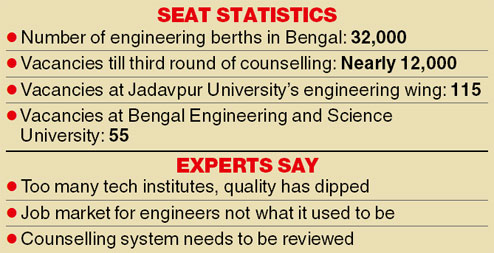 |
Engineering is no longer the abracadabra of academics — the magic word that opens the door to a secure and lucrative career even before a student can put BE or BTech on the résumé.
Nearly 12,000 out of around 32,000 engineering seats in Bengal are vacant after the third round of counselling by the state joint entrance examination board, a trend that has as much to do with the mechanics of the job market as with the mushroom growth of tech institutes.
Officials of the All India Council for Technical Education (AICTE), the national regulator of engineering institutes, said several other states were witnessing a decline in the demand for seats.
In Andhra Pradesh, more than a lakh out of a total of 3.2 lakh engineering seats are estimated to be vacant. Tamil Nadu, which has over 2 lakh seats, has reported nearly 60,000 vacancies this admission season. “A large number of seats in Maharashtra and Rajasthan haven’t found takers as well,” an AICTE official said.
According to P.K. Ray, a former official of the joint entrance examination board who also used to teach at Bengal Engineering and Science University, engineering had lost its sheen mainly because of a decline in the quality of education and infrastructure. “This is true not just of Bengal but also other parts of the country. The number of engineering institutes has grown at a rapid pace at the cost of quality,” he said.
A teacher at Jadavpur University, whose engineering department is rated among the better ones, termed the decline in the popularity of engineering as a career option a “paradigm shift” after decades of being among the top three choices of students and their parents.
“If we treat a particular stream like a marketplace, this trend shows that the supply of engineering seats is outstripping demand. But increased supply alone does not explain such a shift,” he said.
The USP of any engineering course used to be the guarantee of a decent job, but that isn’t the case anymore.
“An engineering degree today does not come with a job guarantee unless the student has graduated from one of the better institutes. Nowadays a BE or BTech degree alone is not enough for career advancement, an MBA degree is a must for vertical movement,” the JU teacher said.
Most students treat an engineering degree as a step towards a reputable B-school rather than a calling card for job interviews. In the nine IIM campuses, over 80 per cent of the students have an engineering background.
A professor with IIM Calcutta said the majority of the engineering graduates on the Joka campus were from the IITs or other reputable institutions, including JU.
So students and guardians have learnt to weigh the quality of an institute and its brand value before spending around Rs 15,000 to Rs 20,000 a month on a degree from there.
Tarun Naskar, who teaches mechanical engineering at JU, said the scramble for seats in the country’s reputable institutes had increased, as opposed to the general decline in demand for engineering degrees.
At least three private engineering colleges of Bengal have not had a single admission this year but what explains the 115 vacancies at JU and 55 at Besu?
Officials said some of the vacant seats in the two institutions were in streams like computer science and information technology, both of which were hard to get into until a few years ago.
“The present market conditions are such that IT and computer science and engineering graduates are not in demand. But there is little explanation for the vacancies in the core engineering subjects at JU and Besu, where career placements have always been good,” said retired Besu professor Ray.
Some teachers blame problems caused by the new online counselling system for the vacancies.
“JU and Besu should not be compared with the private institutes that don’t get students. Vacancies in the two institutions could have been easily filled had counselling been held separately,” said Manoj Mitra, a former engineering and technology dean at JU.
Besu and JU might be exceptions but nobody denies that engineering is suffering a quality crisis.
“A degree alone is no longer a hook. Students know that good placement opportunities come only in a handful of institutes and they would rather not study engineering than settle for a seat in a second or third-rung college,” said Naskar of JU.
Hiring agencies now periodically inform their clients about the quality of engineering institutes, based on which companies plan campus interviews and draw up salary packages for potential recruits.
“The time has come for some of our private colleges to upgrade their facilities if they want to attract bright students,” said Bhaskar Gupta, chairman of the state joint entrance examination board.
Do you think there are too many engineering institutes in Bengal? Tell ttmetro@abpmail.com










